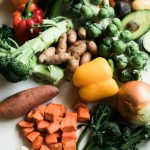If you have gut issues, you’ve probably heard at least one of these three things before:
- “It’s all in your head and you just need to destress”
- “This diet is the best. It has healed thousands of others”
- “Take this probiotic (or other magic supplement) and your gut will be healed”
Perhaps you’ve even taken their advice and tried all of those things.
I know I did.
I meditated for hours, trying to convince myself I was completely healthy.
I spent way too much money on supplements and tried about 20 different diets.
I copied exactly what other people did to heal, but I only got worse.
Until I found what works for me and I managed to completely heal my gut from severe inflammation to no signs of inflammation in 8 months.
Firstly, you need to understand this:
Your health is under attack from many sides, and there’s no single fix for everything.
Our bodies are too complex.
Many things could be the cause of these health problems.
David T. Rubin’s (world renowned expert in IBD) research showed that what we call Crohn’s and Ulcerative Colitis could be more like 50 different diseases, but the way the body expresses these conditions, they all just look similar.
That’s why we combine them all under one term ‘IBD’.
You will never find the one thing that is causing your issues (or you’ll be searching for a very long time).
So, you need to adopt a holistic method.
There are 8 key elements you need to heal your gut:
- Food – Cook all your meals at home and with good ingredients. Food can either serve as medicine or trigger and worsen your symptoms. Certain foods can promote or reduce inflammation, making it the most important element in healing your gut. If you get everything else right but continue eating the wrong foods, you won’t heal. When it comes to food, it’s a make or break situation.
- Movement – has anti-inflammatory effects, reduces stress, helps you detox, boosts mitochondrial production and helps you maintain a positive attitude. Walk more. Stretch. The intensity of your exercise depends on the severity of inflammation. In very severe states, prioritize rest and do not force yourself.
- Supplements – Supporting your body with vital vitamins, minerals, herbs, and well-selected anti-inflammatory and gut healing supplements will help you recover faster. But don’t consume supplements mindlessly. Probiotics is a typical example of this that I see very often. There is a right time and place for specific supplements.
- Sleep – During sleep, your body regenerates, repairs tissues, processes new information, regulates hormones, fights infections, repairs DNA, and combats inflammation. Sleep is critical. Ensure to sleep as much as you need, especially when fighting inflammation.
- Water and drinks – Drink good quality water. Quit coffee and alcohol.
- Circadian Rhythm and Sunlight – Align your daily routine with your body’s natural clock. Get sunlight daily, especially after waking up.
- Education and continuous learning – Take charge of your health and handle challenges with ease. Don’t just mindlessly follow what someone else tells you to do.
- Mindset – Our beliefs about our body and its ability to heal itself play a significant role in the process.
A positive and strong mindset helps reduce stress, improves overall quality of life, and gives you control over who and what you allow into your life.
Don’t stress out about small things.
Healing your gut takes time.
You need to cultivate patience and perseverance.
Healing holistically is not a quick fix as it is when taking medical drugs.
To achieve lasting and effective results, it’s essential to strategically target specific areas.
This is particularly important when you’re starting and need significant healing.
You must approach each of the 8 elements mentioned above carefully and with a plan.
While general recommendations like exercise, meditation, and a diet rich in fruits and vegetables may seem to make sense, you must be very cautious.
For instance, exercise is generally good, but if you’re severely inflamed or iron deficient, it may be better to rest and sleep rather than hitting the gym and pushing through a HIIT workout.
Similarly, a diet rich in fruits and vegetables is generally considered healthy, but if you have severe digestive issues, it’s better to limit your fiber intake and avoid raw foods until you can handle them again.
Some supplements can be helpful, but some can also irritate your gut.
There are appropriate dosages and times for each.
So how and where should you start?
Start by educating yourself and cultivate a positive and resilient mindset.
Take a proactive approach towards healing your gut.
Knowledge is your foundation, paired with the right attitude and understanding you’re on the best way to lifelong health.
Your mindset can make or break you.



